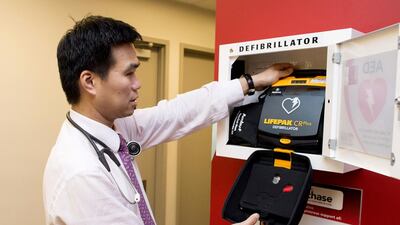I was pleased to read Installation of defibrillators across the country will reduce heart-attack deaths (November 28).
My attention was drawn to this issue about two years ago when I visited the United States.
Healthy people forget that they may one day need immediate medical help.
In the US, defibrillators are found at all international airports and shopping malls.
While there, I spoke to some mall security people and they said they had to go through annual training to be certified as emergency medical assistants.
Kanwar Hayat, Al Ain
Property buyers must be aware
This letter refers to What Indians need to know before buying a property back home (November 30).
The tips for Indian expatriate buyers are very useful.
However, the advice presupposes that the execution of the deals will be transparent and fair. Unfortunately, this may not always be the case.
There are hundreds of gullible investors in large Indian cities who have fallen prey to housing scams perpetrated by builders, politicians and civic regulators.
The basic need for a roof over the head and the fear of ever-rising prices makes buyers believe assurances without verifying the facts.
In order to insure against the legal principle of caveat emptor (buyer beware), it should be made mandatory for the builders to attach an affidavit to the sale deed.
It should say something to the effect that all the necessary permissions, sanctions and approvals have been obtained and relevant legal requirements fulfilled, and that the buyer will be fully indemnified against any violation invoked at any time.
This will provide relief to buyers who don’t understand the jargon or read the small print.
CS Pahtak, India
Iranian deal must assuage anxiety
I am writing about your editorial, Optimism must be cautious over Iran nuclear deal (November 24).
The interim deal between Iran and the world powers is apparently aimed at curbing the Iranian nuclear weapons programme, making the Middle East more secure and free from a nuclear arms race.
But it has raised fears among the Gulf states that Iran might become emboldened and will meddle in the affairs of neighbouring states.
These concerns are justified, given the fact that Iran has not only been supporting and arming the oppressive Syrian regime of Bashar Al Assad and Hizbollah, it is also accused of fomenting trouble in other Gulf countries.
The US administration’s shift in foreign policy, signalling a lack of commitment toward the Arab states, has added to anxiety in this region.
Muneer Ahmad, Abu Dhabi
Nestle responds about child labour
In reference to Human rights and wrongs (November 30), Nestle would like to take the opportunity to make clear that child labour has no place in our supply chain.
We are firmly committed to taking action to eradicate the practice from our cocoa supply in line with our commitments in the Nestle corporate business principles and the Nestle supplier code.
Regarding the infant formula issue, a boycott against Nestle was initiated by the US-based organisation Infant Formula Action Coalition (IFAC) over concerns about our promotion of infant formula in developing countries.
This led to a consultation process with the World Health Organization, Unicef and non-government organisations.
The US boycott ended in 1984 with the signing of a statement of understanding between Nestle and the IFAC.
Nestle Media Relations, Switzerland
No surprise Arabic is popular in UK
I am writing in reference to Arabic overtakes French in importance for Britons (November 29).
Many Britons have never really tried to learn French and they avoid speaking it.
At school, French was not seen as an important subject, nor was it regarded as being important in business circles in the UK.
That Arabic is now more widely spoken is not a big surprise. Many Arabs now live in the UK and it is Arabic – not English, let alone French – that is being spoken in their homes.
Because of the number of Arab children in the UK, Arabic has become a school subject.
Name withheld by request

